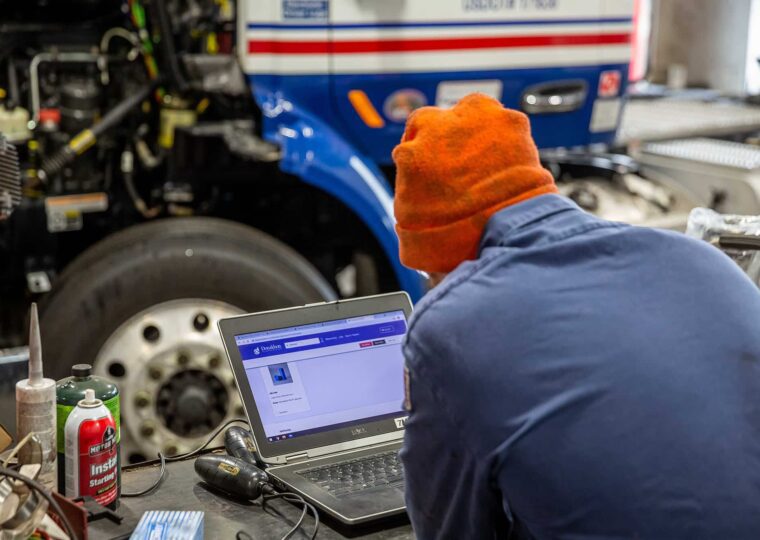In the bustling world of trucking and transportation, the heart and soul of operations lies not just in the cargo or the drivers but in the vehicles that carry them. It’s essential to grasp the importance of fleet maintenance, not only as a means to prolong the life of each truck but as a crucial strategy to ensure safety, maximize operational efficiency, and save on costs.
Contemplating the magnitude of investments made in these heavy-duty machines, it’s clear that ensuring their optimal performance is paramount. We’re going to talk about what exactly fleet maintenance means and why it’s a critical process. Then we’ll cover the basic points of performing fleet maintenance, how technology can help, how much it all might cost, and how you can pick the right maintenance provider.

What is Fleet Maintenance?
Fleet Maintenance is a comprehensive process dedicated to the systematic and proactive management, care, and repair of a collection of trucks or other vehicles used for commercial purposes. It encompasses a range of activities including, but not limited to, regular inspections, scheduled services, emergency repairs, and record-keeping.
The primary goal of fleet maintenance is to ensure that trucks are operating at their peak efficiency, minimizing downtime and unforeseen breakdowns, and ensuring the safety of both the driver and the cargo. In a broader sense, fleet maintenance is the backbone of smooth transportation operations, allowing businesses to fulfill their promises to clients without hitches.
Why is Fleet Maintenance Important?
There are countless reasons to stay up to date on fleet maintenance. Some of the most common reasons include the following:
- Safety: The most compelling reason for regular fleet maintenance is safety. A well-maintained truck is less likely to be involved in accidents caused by mechanical failures. Brake failures, tire blowouts, and engine malfunctions can lead to catastrophic consequences, especially for heavy commercial vehicles.
- Cost Savings: While fleet maintenance does involve a cost, the potential savings are substantial in the long run. Regular maintenance can identify and fix minor issues before they escalate into major, costlier problems. For instance, replacing worn-out brake pads on time is far cheaper than dealing with the aftermath of a brake failure.
- Operational Efficiency: Time is money in the transportation business. Trucks that are regularly maintained face fewer breakdowns, ensuring timely deliveries and keeping operational schedules on track. A well-maintained fleet also promotes a positive brand image, showcasing your company’s commitment to safety and reliability.
- Fuel Efficiency: A truck in top condition operates more efficiently, yielding better fuel economy. Over time, this translates to significant savings, especially given the distances covered by commercial trucks.
Critical Components of Fleet Maintenance
Maintaining a fleet is no small feat. It requires meticulous attention to detail, a proactive approach, and a systematic methodology. The major components of fleet maintenance include:
1. Routine Inspections
Regular inspections are critical in identifying potential problems before they escalate. These checks, which are often carried out daily or weekly, encompass a range of elements:
- Visual Checks: Looking for obvious signs of wear and tear, damage, or any unusual changes to the vehicle.
- Operational Tests: Ensuring lights, brakes, horns, and other vital components function correctly.
- Fluid Levels: Checking and topping up, if necessary, oils, coolants, and other essential fluids.
2. Scheduled Services
Much like how humans benefit from regular health check-ups, trucks thrive on scheduled services. These are typically based on mileage or time intervals and focus on:
- Engine: Oil changes, air filter replacements, and checking the overall health of the engine.
- Transmission: Ensuring the transmission is operating smoothly and replacing transmission fluid as required.
- Tires: Rotating, balancing, checking for proper inflation, and replacing tires when tread levels are too low.
- Brakes: Inspecting brake pads for wear, checking brake fluids, and ensuring the entire braking system is in top-notch condition.
3. Emergency Repairs
Despite our best efforts, unforeseen breakdowns can and do occur. Emergency repairs deal with these unexpected events, ensuring minimal downtime and disruption:
- Troubleshooting: Identifying the root cause of the breakdown.
- Immediate Repairs: Addressing critical issues to get the truck back on the road.
- Follow-Up: After the immediate fix, ensure that there’s a thorough check meant to prevent future breakdowns stemming from the same issue.
4. Documentation & Record Keeping
While documentation and record keeping may not have as immediate of an effect as turning a wrench, it’s still a critical aspect of fleet management. Documentation helps with:
- Maintenance Scheduling: Knowing when the next service is due, based on previous records.
- Warranty Claims: Having a detailed record helps in claiming warranties when applicable.
- Legal Compliance: Ensuring all vehicles meet the mandated safety and operational standards.
- Cost Analysis: Reviewing records to understand maintenance costs and identify potential areas for savings.
 Improving Fleet Maintenance with Technology
Improving Fleet Maintenance with Technology
Leveraging technological advancements can streamline operations, enhance accuracy, and provide unprecedented insights into fleet health. There are several ways in which technology can help give you insights into your fleet performance.
First, technology can help provide state-of-the-art diagnostics. Modern diagnostic tools can read and interpret data from a vehicle’s onboard computer, identifying issues even before they manifest as tangible problems. These tools can pinpoint malfunctions, helping technicians address them swiftly and precisely.
Additionally, comprehensive software solutions offer real-time tracking of trucks on the road, monitor fuel efficiency, schedule maintenance reminders, and even provide predictive analysis. Such tools are invaluable for fleet managers, ensuring proactive rather than reactive maintenance.
Telematics is used to not only collect and transmit vehicle driving information but to transmit that data along with driving patterns and more. This data-driven approach aids in understanding wear and tear, optimizing routes for efficiency, and ensuring driver compliance with safety standards.
Finally, mobile apps are used to help manage fleet maintenance as well. These apps allow drivers to report issues, schedule services, or even perform guided self-checks on their trucks.
Costs Involved in Fleet Maintenance
Fleet maintenance costs encompass direct servicing expenses, preventative measures, and the indirect costs of downtime. While proactive maintenance has associated costs, it often prevents costly breakdowns later which affect both the timeline and the bottom line. Administrative overheads, though not tied directly to repairs, are crucial for smooth fleet operations. Every dollar spent is an investment in safety, longevity, and operational efficiency.
Choosing the Right Fleet Maintenance Service Provider
Choosing an ideal fleet maintenance partner is pivotal. Consider their track record and expertise. A provider should offer tailored solutions, be adept with modern technological tools, and maintain transparency in operations. Additionally, reviews and feedback from other fleet owners can give insights into their reliability and effectiveness. Your service provider should act as a seamless extension of your operations, ensuring your fleet’s top performance.
Trust Blaine Brothers With Your Organization’s Fleet Maintenance
The intricate dance of fleet maintenance is a balance of proactive measures, timely interventions, and strategic investments. As we’ve navigated through the nuances of fleet care, it’s evident that regular maintenance isn’t just a task on a checklist, it’s the cornerstone of successful fleet operations.
Blaine Brothers stands ready to partner with you, offering decades of expertise, cutting-edge technology, and a commitment to keeping your fleet at its best. We can help you count down the miles to impeccable fleet health and unparalleled performance. Reach out today to get started!


 Improving Fleet Maintenance with Technology
Improving Fleet Maintenance with Technology